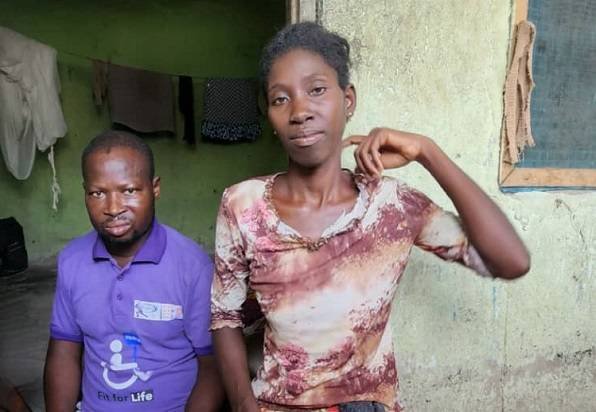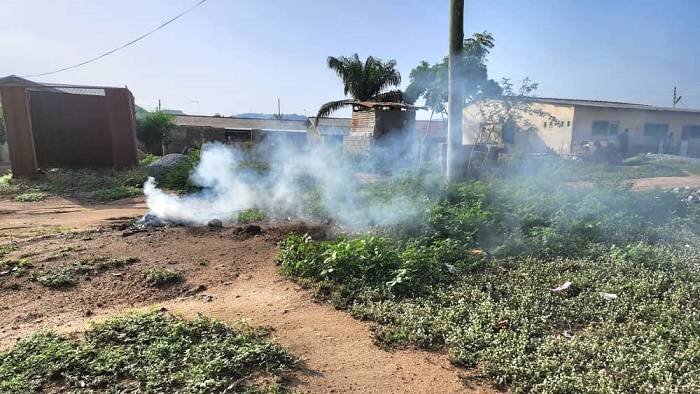Accra’s Toxic Air: Open Waste Burning Takes a Toll on Public Health

ACCRA, Ghana – Life has been challenging enough for Francis Takyi, a mobile phone repairer who relies on a crutch to get around because of a congenital leg condition. But for close to a year the forty-year-old father of six has faced a new battle:
A severe respiratory condition has debilitated Mr Takyi making it impossible for him to work. He now struggles just to talk.
“I do not remember the last time I spent a whole day without finding difficulty breathing,” says Mr Takyi, struggling to inhale enough air to speak.
The high cost of a hospital visit has stopped him from getting a proper diagnosis. Instead he has sought herbal remedies and spent his limited earnings without finding a lasting solution to the health issues that are terrifying him.
Now the medicine has stopped working. He fears the worst. “Each day that passes takes me closer to my grave.”

Mr Takyi may not know what his diagnosis is but he is fairly certain of the cause. His condition worsens in the mornings when his neighbours begin burning their waste after sweeping their compounds.
Burning waste is a common practice in his area, Brigade, in the Ga South Municipality of the Greater Accra Region, as it is in much of the country.
Experts say waste burning is a significant source of dangerous carcinogens, including dioxins and furans, as well as black carbon that can cause lung and respiratory diseases like pneumonia and chronic obstructive pulmonary disease. The smaller particles, like those from plastic, can get into the bloodstream and cause heart disease, stroke, diabetes and cancer. These pollutants, health experts warn, are sickening and killing tens of thousands of Ghanaians each year.
“What makes this issue serious is that people do not segregate waste, so you find all manner of waste products including plastics being burnt in the open,” says Dr Gloria Ani Asamoah of the Korle Bu Polyclinic. She cautions people to desist from burning household garbage and use waste management operators to deal with their waste.
Accra is now Africa’s fastest growing city and as the population increases quickly so too does waste and air pollution. Local and national government are under growing pressure to address it. Waste collection services provided by a range of companies across the region are supposed to collect waste in return for fees paid by customers.
Many Ghanaians refuse to use waste management operators for a range of reasons. Kwesi Adjiri, a resident of Accra’s Nima community, says he resorts to burning refuse in his backyard due to the unreliable service from the waste management company he subscribed to. He says he used to pay GH₵55.00 cedis each month for his waste to be collected every two weeks. But the company frequently failed to adhere to the schedule, sometimes taking up to two months to make a single collection.
“The front of my house, where the bin is kept, was always untidy because of the missed collections,” Mr Adjiri says. “So, some of my neighbours and I have resorted to doing it our own way.”
Yakubu Issah Abdallah, another resident of Nima, burns waste at home because he says he cannot afford the subscription cost for waste management services.
“I have never subscribed to such services, and I don’t think I ever will,” Abdallah says. “I have seven children, and the financial burden on me is too much. I am always looking for ways to save money.”
Desmond Opoku Sarpong, a resident of Darkuma, admits he frequently receives complaints from his neighbours about burning waste. Despite understanding the health risks, he feels he has no alternative.

At Odorkor, Akua Ofosu, a trader, is planning to relocate due to the frequent burning of waste. The constant exposure to smoke has been causing her respiratory distress. Ms Ofosu says the smoke makes breathing difficult, causing her to feel nauseous and have headaches each morning.
“Right behind my room is the spot where my landlord burns his waste because there is no proper disposal area,” she says.
Supervision of local waste collection companies falls to local assemblies. Ms Sally Biney, Greater Accra East Regional Director of the Environmental Protection Agency (EPA), urged local residents to report failures by waste collectors to their local assemblies.

“Timely reporting of waste collecting companies who do not adhere strictly to their waste collection schedules can help resolve this issue of open waste burning because we are ready to take them on,” says Ms Biney.
She reiterated the EPA’s commitment to safeguarding public health and the environment, urging residents to cooperate with waste management protocols and utilise official waste collection services.
Mr Charles Maccarthy Tsatsu, Municipal Environmental Health Officer of the Ayawaso East Assembly, says open waste burning is unlawful.
“We keep prosecuting offenders while creating awareness about the health implications of open burning during community durbars,” he says.
Addressing claims that operators sometimes fail to meet their scheduled obligations, Mr Tsatsu acknowledges that such instances do occur. However, he insists that the Ayawaso East Assembly ensures that companies do not habitually use vehicle malfunctions as an excuse for missed collections.
Dr Ransford Antwi, a physician at the Amanfrom Polyclinic, says that many patients from the local communities of Brigade, Maheam, and Galilea in the Ga South Municipality suffer from Chronic Obstructive Pulmonary Disease (COPD) and other respiratory ailments. These conditions are treated at the polyclinic or referred to larger hospitals like Ridge, 37 Military, or Korle Bu Teaching Hospitals in Accra.
Dr Antwi confirms that frequent exposure to harmful chemicals from open burning is likely a significant cause of these diseases.

This situation, he says, underscores the urgent need for improved waste management infrastructure to address health concerns and provide residents with safer disposal methods.
Attempts to reach officials at the Ga South Municipal Assembly regarding the matter were unsuccessful, as multiple calls went unanswered and visits to the assembly also yielded no results.
Until waste burning is stopped, medical experts warn residents to wear nose masks and shut their windows when open burning is taking place and to avoid the smoke as much as possible.
BY RAISSA SAMBOU
****
This story was in collaboration with New Narratives. Funding was provided by the Clean Air Fund. The funder had no say in the content of the story.





